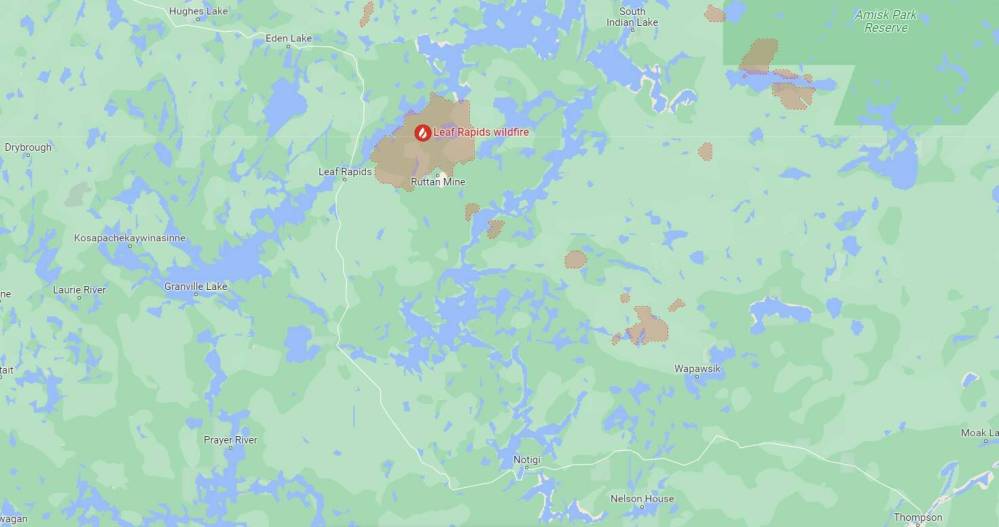
Residents of Leaf Rapids, who fled the northern town June 26 owing to wildfires, say they have to share information amongst themselves because provincial officials have shirked their responsibility.
About 350 people were instructed to drive to Thompson, 217 kilometres to the east, after a state of emergency was declared. Evacuees say the province set them up in hotels and gave them cheques to pay for basic needs. They say they were left in the dark about how to access supports, find loved ones, receive updates on wildfire mitigation or get medical attention.
“They didn’t know where they were supposed to call for information, they didn’t know who was going to be giving them updates on what’s happening in Leaf Rapids and when they can go home,” said evacuee Lianna Anderson, who is staying in Thompson, Monday.

“People were starting to get frantic. People were getting angry, people were crying … (We) called a meeting and said, enough of this.”
Leaf Rapids doesn’t have a mayor or council and is technically led by a provincial administrator.
Anderson and six others formed a committee to organize a list of evacuees. They have tried to maintain connections between evacuees and donors and support groups and have met with families in their hotel rooms to provide answers. They meet several times a day, and they’ve even created a question-and-answer sheet to hand out to evacuees. They thought provincial workers would perform those functions.
“Wednesday, I finally got a group together, and I do believe there were 150 people there,” said committee member Cecil Sanderson. “I asked the committee members, let’s form a group. Nobody’s taking care of us, nobody’s doing anything for us, let’s form a group.”
Provincial government press secretaries were out of office Monday, for the Canada Day long weekend, and did not respond to a request for information.
Anderson and Sanderson said evacuees’ hotel rooms have bedbugs and cockroaches, lack proper water and sewer and have no air conditioning in the midst of high temperatures. Large families have been cramped into single rooms and there has been a lack of support for seniors and people with physical and mental disabilities.
“What’s going to happen with these people taking home bedbugs and cockroaches to a community, a municipality at that, that’s been on a boil-water advisory for over 10 years?” she said.
In terms of the money given to evacuees, Anderson said some have had to survive on $35 a day, and others weren’t able to get the cheques right away because they forgot their identification in Leaf Rapids.
Their committee has been working with the Northern Patient Transportation Program because they said evacuees have been asking them how to access clinics in Thompson.
“There’s major language barriers, the majority of our elderly people, Cree is their first language. We’ve got literacy barriers, we’ve got mobility barriers and disability barriers, the list goes on,” Anderson said.
The northern chiefs organization has provided meals for evacuees. Food, water and toiletries have been donated via an online effort.
Some businesses in Thompson have stepped up, including the Thompson McDonald’s that provided a pancake breakfast to evacuees Monday.
Northern Grand Chief Garrison Settee said the organization is aware of evacuees’ concerns.
“We understand that it is difficult to assist people in need, but in this case, the province failed to provide necessities in a timely fashion,” he said in a statement last week.
He said he blames an inefficient bureaucracy.
“That, and the fact there is no mayor or council in Leaf Rapids, makes it a difficult proposition, at best, for their citizens to access vital services, never mind finding a reliable means of assistance in an emergency. Now that we know what the issue is, it is up to the province to fix it.”
Emergency crews continue to battle the blaze, which is 105 square kilometres in size and about eight kilometres away from the town.
Anderson said she wants to see more in-depth reports on the status of the fire fight.
“That’s our home, and we want to go back,” she said. “We want to go back.”
There were 68 fires in Manitoba as of Sunday; five were classified as out of control.


